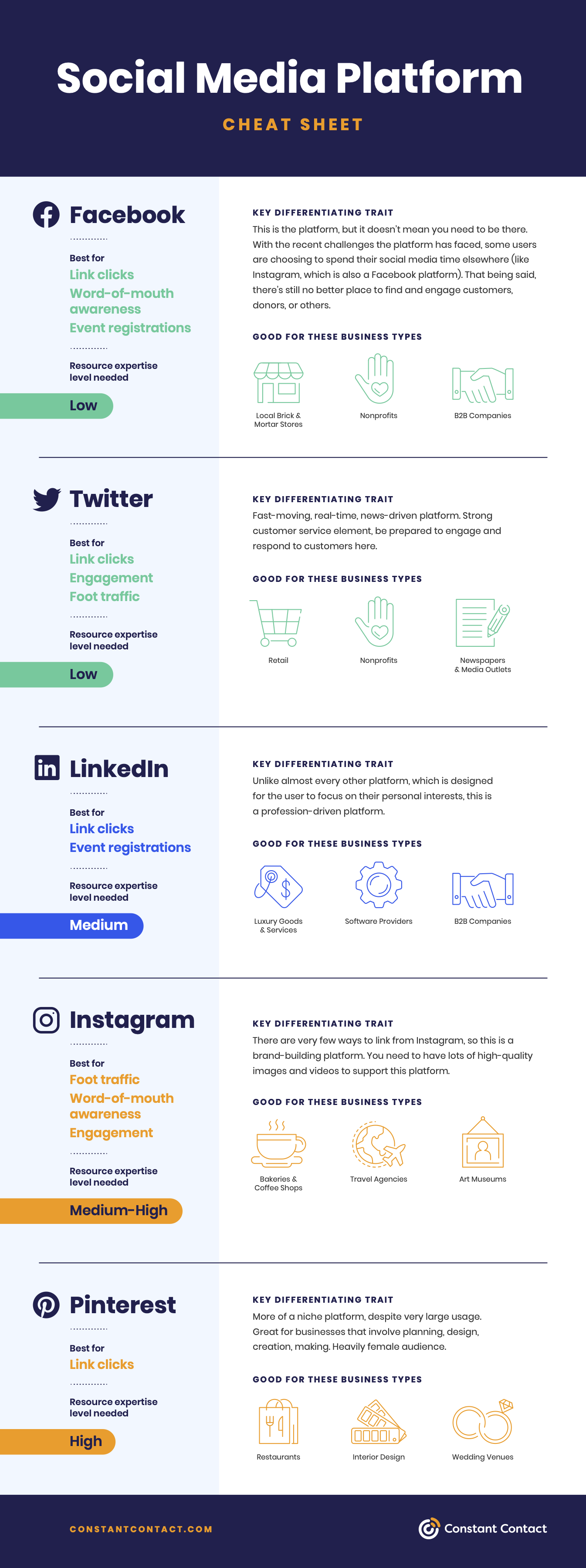There are almost too many social media platforms available today, so it’s no wonder that many of us are left confused and maybe a bit overwhelmed. If you are looking to promote and expand your business, you’ve probably asked yourself, “What is the best social media for business?”

When I’m out talking to small business owners or those who work in social media marketing for a living, I often get a few very similar questions:
“Do I need to be on every social media platform? There are so many!”
“Facebook is the place to be, right? Everyone is there?”
“Seriously, what platform do I need to be on for my business?”
Ultimately, the answer to these questions is: “it depends.” There is no general “best” social media, but there is one that is best suited for your business. Your answer will depend on three key factors:
- The industry you’re in
- The level of resources you can dedicate to these channels
- Your goals
Before you open an account on every major social networking platform, evaluate these three components. You likely don’t need to have a presence on all social media channels, and you most definitely don’t want to have the same social media strategy across all media channels.
Don’t make the mistake of spending time on a channel you don’t need, and let’s evaluate other social media platforms your business or organization should be on, according to these three key factors. Once you identify these factors it’ll be easy to identify the best social media for business based on your audience, the types of campaigns you hope to run and your strategy.
What is your industry?
Identifying your industry is important for all businesses when assessing what social media platforms will best benefit their brand.
For example, if you’re a B2B company that sells a very specific software tool for health care practitioners, your product isn’t very visual, and your audience is very professional, Instagram or Pinterest aren’t the platforms in which you want to assert your social media presence.
In this scenario, using LinkedIn and/or Facebook would be in your best interest. Both of these social media platforms cater to broader audiences and have detailed ad-targeting capabilities related to specific professions, and have a higher level of professionalism than other social channels.
However, if your industry is in the creative space or home decor, Pinterest would be the perfect place to promote engagement from your target audience. Bottom line: know your industry and your target audience, and know it well.
What resources can you dedicate to social media?
Despite what you might think, social media marketing is not free. Although social networking sites are free to use, a robust digital marketing strategy requires both an organic and paid social presence.
It costs time, a lot of mental and creative energy — and, of course, money to manage social media channels.
It’s a lot easier, smarter, and more efficient to use a DIY social media planning and scheduling tool, like the one built right into Constant Contact.; an employee or an agency to support you (like our Marketing Advisors; or in advertising dollars (like with our Facebook Lead Ads integration).
The more you invest, and the more you grow your presence and activity, the more benefits you reap. Posting more organically and investing more in social media advertising widens the audience that will be exposed to your brand. You’ll also be able to reach your target audience a lot quicker.
What are your goals?
Lastly, the best social media for business depends on your marketing goals.
Do you want more foot traffic to your local business? Trying to drive traffic to your online store or donation page? Do you want to increase brand awareness, build your list of potential customers, promote a new product launch?
TIP: See our other blog post on using social media to grow your business!
Depending on your goals, your social media strategy will look different, and so will your social media presence. Knowing your goals is the best way to understand which social media sites your business should be active on, what content you should be including in your posts and ads, and which social channels are best for reaching your target audience.
Still have some questions? Try our quiz to see more ways to impact your business with social media.
With those components in mind, the following breakdown by platform will help you best assess your social marketing strategy:
- Facebook: With nearly 2.5 billion monthly active users, Facebook is the biggest player in the game, making it the best place for businesses whose goals are to promote brand awareness, generate leads, or to retarget audiences that have already engaged with their brand. Facebook typically yields a significant return on investment as well.
- Instagram: Instagram has similar benefits to Facebook, with two exceptions. Instagram’s audience skews a bit younger than Facebook and Instagram allows for more opportunity to garner engagement without a budget, since it’s easier for businesses to gain an organic following on Instagram than it is on Facebook (thanks to Instagram’s discover page, hashtags, and location tools.) Instagram is
also a great platform to utilize influencers and influencer marketing. Some key industries that work well on Instagram are food, travel and museums. - Pinterest: Pinterest is more of a niche platform despite being a very large one. Pinterest is a great platform to invest time and money into if your business is in the creative industry and if your target audience is female. This platform is best used for gaining clicks to your website.
- Twitter: Twitter has a strong customer service element to it, as it allows you to engage directly with your audience and customers, plus, requires very little expertise- just some quality content and the willingness to post consistently and engage frequently.
- Linkedin: This profession-driven platform is a must in your media strategy if you’re a b2b company. It also works well for luxury goods and services and technical companies such as software providers.

Not sure where to start with marketing? That’s why we created The Download.
We know you're busy trying to grow your big idea. Because we work closely with small businesses like yours every day. Drawing on decades of experience, we're now sharing our online marketing knowledge in a free guide that's packed with tips, examples of what works and what doesn't, and a whole lot more, like: *How people find you online* *How to set yourself up for success* *How it all comes together* *How online marketing can work for you*




